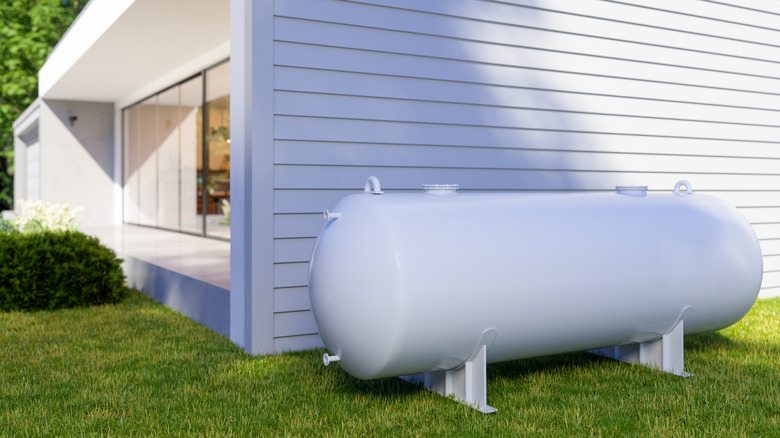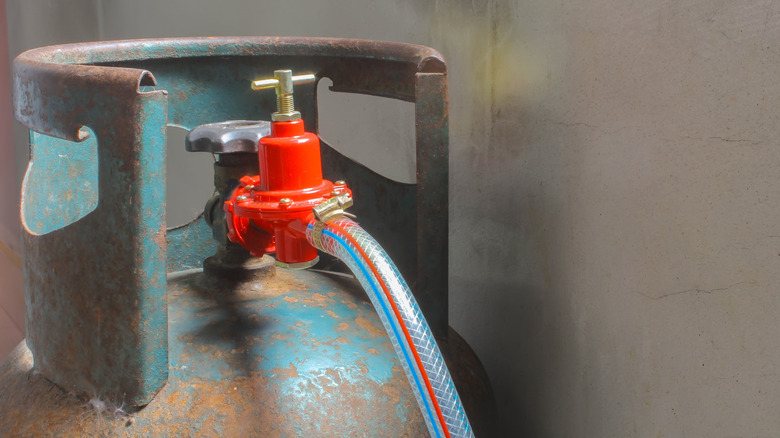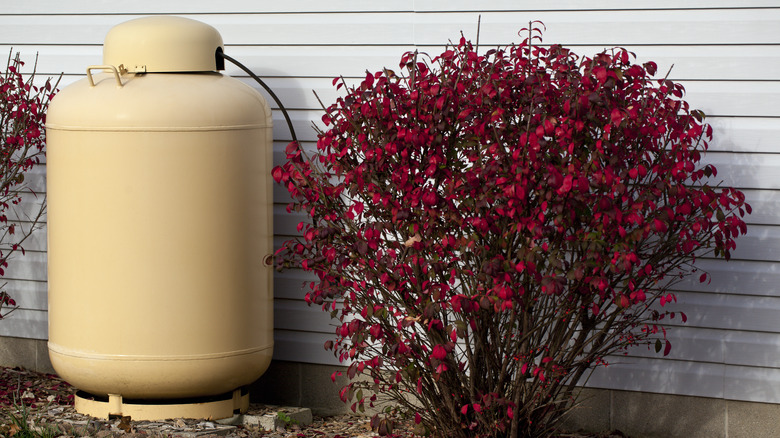Here's How To Figure Out Where Your Propane Tank Leak Is Coming From
If you suspect a leak from your propane tank, don't try to use it. This flammable fuel source can create a significant and dangerous fire within moments. If you experience a rotten egg smell or are suddenly using more propane at a faster rate than you have in the past, assume there's a leak somewhere. There are a few ways to figure out where that leak is coming from, including using soap and water to detect the movement of gas.
Both propane tanks for grills and whole-home propane tanks can develop leaks. Ultimately, if your home's propane tank has a leak, or you are simply unsure if there's a leak, make it a priority to turn off all appliances and call in an HVAC technician or propane supplier to take a closer look. If you decide to check your grill propane tank and notice is surprisingly empty, that could be a sign there's a leak. If your grill's propane tank leaks, don't use it. Turn the valve to the grill off and replace the tank with a new one.
No matter what type of tank you have, safety is key. Any noticeable damage to these tanks or signs of rusting should be considered a high risk for leaks. You can also do a few things to help reduce the risk of further leaks (and explosions from such leaks).
How to detect a propane tank leak with soap
A strong, bad odor that smells like a skunk sprayed your home isn't something to brush off. It's often ideal to leave your home and call the fire department to come and check for the source of that leak. However, when it's not too strong, or you're not really sure if there is a leak, there are a few steps you can take yourself to determine if your propane tank is having issues.
First, locate your propane tank and turn it off at the valve. Then, apply a coating of mild dish soap and water to the exterior of the tank, specifically to the cylinder valve. Locate the spot where the valve connects directly to the regulator outlet. Don't lather it. Then, slowly open the valve and watch this area. If you see any bubbles forming, often just small ones, that could indicate that there's a propane leak occurring. The valve shouldn't allow any propane to leak into the surrounding air, and the bubbles you see indicate that's not the case.
Also, you can purchase a leak detector solution that works in much the same way. This product is available at most home improvement stores and tends to be a bit more accurate than the soap itself. If you purchase this product, follow the manufacturer's directions for use.
What to do if you think there's a propane tank leak
Those telltale bubbles are not something to ignore, but what you do next makes a difference. Turn off the valve again, and ensure it is tightly closed. Then, for a whole-home propane tank, call your HVAC or plumbing professional for an inspection and repair. Don't try to use the propane tank at all. At the same time, you shouldn't operate your phone near it, turn on any appliance to it, or light any other sources. Most often, a replacement tank is necessary.
There are a few simple things you can do to reduce this risk. First, be sure to have your propane tank inspected by a licensed professional or your propane supplier at least once a year. If you notice deterioration in the tank, report that as soon as possible. Keep children away from these tanks, too. If there's any type of accident with the tank, which isn't uncommon, don't use it until it's been professionally inspected. It's also beneficial to ensure the tanks are protected by fencing or other structures to avoid vehicular accidents and painted a reflective color so they're easy to see. Even small leaks can create significant fire risks, but with proper propane tank safety, you can keep your home protected.


